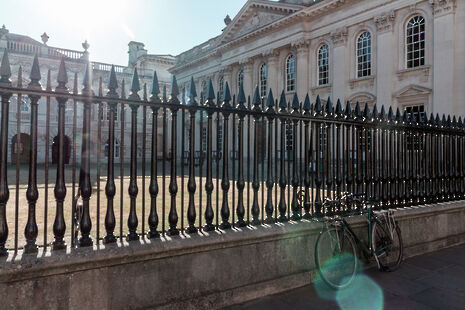Class officers are essential if access is to go beyond admissions
Olivia Emily argues that whilst the introduction of CUSU class officers is a step in the right direction, further action is needed

As a student from a working-class background, the unanimous decision by the CUSU liberation campaigns WomCam and the Disabled Students’ Campaign to establish roles for class representatives is extremely gratifying. However, it is only the first step in ensuring access support doesn’t end once you’ve arrived at university.
Cambridge clearly has accessibility issues for working class students before they arrive here. Along with its global reputation of excellence comes an intimidating history of accepting very privileged students: the kind of student whose parents went to Cambridge and for whom it was always an option. And, apparently, the kind of student The Times is sycophantic towards. Indeed, their recent front-page headline, “Private school woe over rise of state pupils at Oxbridge” is sickeningly elitist and classist, and it reminds me of Lord Adonis’ assertion earlier this year that, essentially, state-school students – or “disadvantaged applicants” – should be annexed to new colleges created especially for them. The image external media paints (and keeps painting) of the typical ‘Cambridge student’ is damaging to less-privileged students who haven’t always been surrounded by such a wealth of opportunity and support. It exacerbates the main issue with accessibility at Cambridge: that prospective applicants simply can’t imagine themselves studying here, because very few people ‘like them’ are already here.
We cannot expect working class students to feel comfortable in Cambridge when such classist scandals keep happening right on their doorstep
What is most worrying of all, however, is that this media presentation of Cambridge is not far from the reality. According to Cambridge’s 2017 admissions statistics, only 10.3% of students were from ‘OAC flag’ areas – areas with less advantaged socio-economic characteristics. This isn’t because students from these areas are less capable, but because they are simply not applying. Undeniably, the warped presentation of Cambridge perpetuated in external conversation does not help. This needs to change.
But whilst some JCRs and access campaigns like Class Act dedicate themselves to encouraging applicants from all backgrounds to apply, that privileged external image of Cambridge is still changing very slowly. Almost every year, there is a privilege scandal in Cambridge - like with the Trinity Hall Crescents drinking society last year, or the Pembroke student who burned a £20 note in front of a homeless man the year before. How can we expect students from less-privileged backgrounds to ever imagine Cambridge as their home when these are the news stories they’re seeing in papers and on TV? We cannot expect working class students to feel comfortable in Cambridge when such classist scandals keep happening right on their doorsteps.
Class issues don’t end at admission. When working class students actually arrive in Cambridge, there is an ignorance surrounding privilege. Once we’ve secured our places, the assumption is that Cambridge has levelled the playing field and we now all have access to the same opportunities and lifestyles. This just isn’t true. Whilst colleges, like Jesus, offering discounted May Ball tickets to recipients of the Cambridge Bursary was a step in the right direction, it nonetheless highlights the ignorance surrounding privilege. Just as a lot of applicants can’t imagine themselves at Cambridge, a lot of Cambridge students can’t imagine themselves at May Balls because of the indulgence, the extravagance, and the exuberant cost (money spent doesn’t end at the ticket). Lots of us may never have worn a suit or a ball dress before – it is a world away from my working-class background.
Having class officers on WomCam and the Disabled Students Campaign is important, yes, but it is also only the beginning of a journey to absolute class equality and representation in Cambridge. How can we seriously think we’re succeeding in access if we forget about the lesser-privileged students when they actually arrive in Cambridge? Access should not be a publicity stunt to make Cambridge appear statistically attainable for all, it should be an ongoing system of support that doesn’t end when you get here.
Day-to-day Cambridge life can be a struggle for working class students who don’t feel represented
Some colleges are trying to address this. Murray Edwards, for example, hold access forums every term so people of an access background (or anyone interested in aiding access) can come together for an evening to discuss access issues – including how it feels to be from a working class culture. Sophie English, incoming Access Officer at Murray Edwards told me: “I think it’s so important to have a social network of people who understand the difficulties, but also to share in the positives, of coming from a background a bit different to the Cambridge average.”
Day-to-day Cambridge life can be a struggle for working class students who don’t feel represented, or don’t feel they have anyone to talk to about their personal issues with class in Cambridge. There is a luxury-focussed lifestyle in Cambridge: May Balls, stash, formal dinners, gowns – all staple parts of the ‘Cambridge experience,’ all with costs many of us want to avoid and yet concede to so as to conform and experience many of our peers take for granted. Class Act is a brilliant campaign for creating a sense of community across the university, but the lack of JCR class officers in most colleges means students can feel isolated and not know where to turn with their issues. We already have a plethora of JCR access officers that look outwards, but we need more class officers that look inwards to support the students that are already here.
We need class representation on JCRs providing accessible, unintimidating support that is normalised for working class students. Whether this is merely an issue of establishing distinguished class-related roles to fall under the bracket of ‘access officer,’ such as at Murray Edwards, or whether this should involve the creation of a new role entirely, it’s time we recognised that class issues in Cambridge don’t end once you’ve secured your place – it’s an ongoing experience of alienation that must change.
 News / Cambridge academics sign open letter criticising research funding changes22 February 2026
News / Cambridge academics sign open letter criticising research funding changes22 February 2026 News / Student and union protesters hold ‘Trans Liberation Solidarity Rally’ 24 February 2026
News / Student and union protesters hold ‘Trans Liberation Solidarity Rally’ 24 February 2026 News / Union speakers condemn ‘hateful’ Katie Hopkins speech14 February 2026
News / Union speakers condemn ‘hateful’ Katie Hopkins speech14 February 2026 Features / Beyond the porters’ lodge: is life better outside college?24 February 2026
Features / Beyond the porters’ lodge: is life better outside college?24 February 2026 Theatre / Footlights Spring Revue? Don’t Mind if I Do!25 February 2026
Theatre / Footlights Spring Revue? Don’t Mind if I Do!25 February 2026









